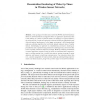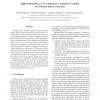10 search results - page 2 / 2 » Benchmarking Latency Effects on Mobility Tracking in WSNs |
ICDCSW
2009
IEEE
13 years 11 months ago
2009
IEEE
—The number of active nodes in a WSN deployment governs both the longevity of the network and the accuracy of applications using the network’s data. As node hibernation techniq...
EWSN
2007
Springer
14 years 4 months ago
2007
Springer
Duty-cycling in wireless sensor networks (WSNs) has both beneficial effects on network lifetime and negative effects on application performance due to the inability of a sensor to ...
WINET
2011
12 years 11 months ago
2011
During the last decade, Wireless Sensor Networks (WSNs) have emerged and matured at such point that currently support several applications like environment control, intelligent bu...
MOBICOM
2000
ACM
13 years 9 months ago
2000
ACM
We present the design and implementation of an end-to-end architecture for Internet host mobility using dynamic updates to the Domain Name System (DNS) to track host location. Exi...
IWMM
2009
Springer
13 years 11 months ago
2009
Springer
Good spatial locality alleviates both the latency and bandwidth problem of memory by boosting the effect of prefetching and improving the utilization of cache. However, convention...


